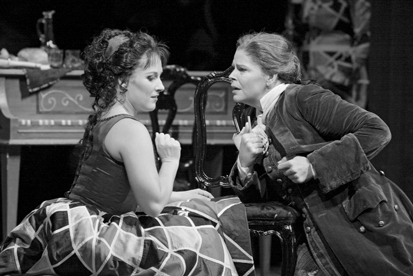Violeta Urmana, Diana Damrau bring warm stage presence to the Met
It’s always a treat to start the season with a pleasant surprise, and an exciting new dramatic soprano is one of the nicest discoveries of all—particularly when she heads up one of the strongest ensemble casts the Metropolitan Opera has fielded in years.
The“new” soprano is Violeta Urmana, who has been heard up until now in New York and elsewhere mostly in mezzo-soprano parts. Her success in the title role of Strauss’s “Ariadne auf Naxos” (September 29) confirms that her move into higher repertoire is a smart one. A bit diffused to begin with, her voice soared to the first high B-flat in “Es gibt ein Reich” like the sun bursting through clouds. It’s not a particularly distinctive voice, but it’s warm and flexible and capable of fascinating subtleties of color. Urmana’s singing was always immaculately musical but never stiff or mannered. She is an intense and sympathetic actress with an innate onstage dignity. It will be most interesting to hear her in the Italian dramatic soprano role of La Gioconda at the Met next season.
Urmana has been singing in New York since 2001, but the other leading soprano in this opera is genuinely new to the Met. Diana Damrau made her debut this season as Zerbinetta, and she is an important addition to the roster. In an era when cold, self-involved performance is the norm, Damrau is a born stage animal, the sort of performer who seems to have a personal relationship with every individual in the audience as soon as she enters the scene. Her acting in Zerbinetta’s prologue scene with the Composer was marked by mercurial shifts of mood from coquettishness to genuine warmth. Later, she crackled through her commedia turn with the boundless energy of a Broadway baby. Her lyric-coloratura instrument encompassed the myriad difficulties of “Grossmächtige Prinzessin” handily, though I do wish she would at least attempt to sing real trills instead of copping out with tuned giggles.
A more familiar Met artist, Susan Graham, sings her first local performances of the Composer here this season. She has had success with this role in other theaters, and certainly her velvety mezzo makes for luxury casting. On the evidence of this performance, though, Graham seems to have fallen victim to a minor attack of Fleming-style over-interpretation. She manipulates her voice to achieve some impressive high pianissimo effects, but at the cost of spread, blowsy tone in the higher reaches of her aria that closes the act.
Jon Villars suffered his own high-note troubles later in the opera as Bacchus, omitting most of the admittedly difficult top B-flats that pepper this role. It’s a pity, because in appearance and movement, Villars is the closest thing to a young god I have ever seen in this part. The voice, except for those pesky high notes, sounds huge and glamorous, a genuine dramatic tenor. The conducting of Kirill Petrenko lacked both the poetry and ponderousness of James Levine’s more familiar interpretation.
The Ariadne of this opera and the female title character of Paul Dukas’ “Ariane et Barbe-bleu” (heard October 6 at the New York City Opera) share no more than a name. No hint of the Greek legend can be found in the meandering symbolist libretto by Maurice Maeterlinck. The main attraction of the piece is the brilliant orchestration, reminiscent of Debussy but with a bolder palette of color. Conductor Leon Botstein coaxed the maximum dazzle from the tireless NYCO orchestra. The virtuoso effects, though, carry little emotional resonance, since Dukas uses them to depict inanimate objects, for example, a roomful of rubies cascading through an open door.
Only Ariane and her companion the Nourrice have more than a few lines to sing, and in fact, Ariane only rarely gets a breather all night long. Her extended scene Act 2 leading up to the breaking of the dungeon window requires sustained high singing over a heavy orchestra for almost half an hour without a break. In this grueling role, Renate Behle’s steely soprano doesn’t exactly please the ear, and toward the end of the night the vibrato began to judder. However, she earned respect and a warm ovation for lasting the course.
In her chic upswept hairdo and elegant cobalt-blue frock (costumes by Louis Désiré), Behle resembled the 1940s French film star Arletty. The soprano’s quiet physical authority compensated for Paul-Emile Fourny’s meager minimal production. The director’s one really striking idea was to imprison the five wives in vitrines like museum exhibits; otherwise this “Ariane” resembled a dozen other NYCO box-set shows.
Sadly, both these operas played to poor houses; whole rows of empty seats gaped in the upper levels of the Met, and the NYCO’s audience looked heavily papered. Surely the whopping price of tickets—a $220 top at the Met—has something to do with driving the public away.
James Jorden is the producer of the podcast “Unnatural Acts of Opera,” availabe at parterre.com.
gaycitynews.com


































